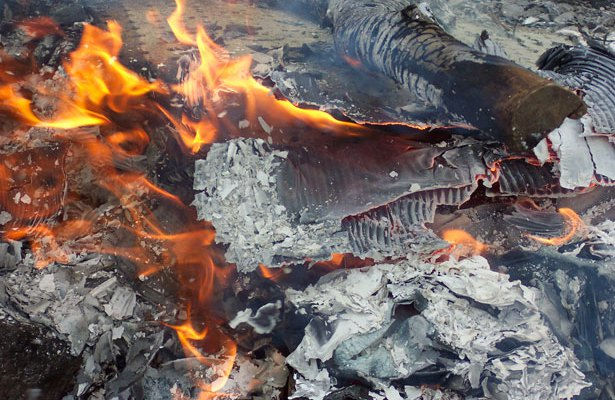The Price of Burning a Good Book
- Rip Kissler
- Aug 31, 2015
- 3 min read

With less and less people reading books, it is important to look at a world where books are forbidden
By Rip Kissler
The Gutenberg Parenthesis states that the era between the 15th and 20th centuries was a blip in the sense that it was text dominated, as opposed to the orality of before and after. This is, in a sense, one of the key themes of Ray Bradbury’s 1953 novel Fahrenheit 451. The above stated parenthesis looks at the transition back to a more orally dominated society in a more natural way, whereas Bradbury’s society is forbidden books for the purpose of pleasure. This is no surprise when we look at what was happening in the U.S. at this time. McCarthyism and The House Un-American Committee were starting to impede on the lives of ordinary Americans.
The book starts with the joy of destruction. “It was a pleasure to burn.” What we’re looking at is the tendency humans sometimes have of picking destruction over creation. This usually leads to an imbalanced world and it is this our protagonist, Guy Montag, is starting to feel. His society is told that books are the source of all unhappiness. As a fireman, his main job is to burn books, so why is he so unhappy? In work, in his marriage, just life in general.
In Fahrenheit 451, the firemen create fires instead of putting them out. They are feared, not like the well-earned respect they have today. They burn the books and the houses that contain them. They hunt the perpetrators with the help of The Mechanical Hound, an eight legged creature that follows the scent and then injects procaine to subdue the target.
Montag is starting to have serious doubts about his job and this extends to the world in general. For example, he is pretty sure that firemen used to put out fires, before all the houses were fireproofed. This is something his Chief, Beatty, sets him straight on. The firemen were surplus to requirements so they ended up burning books instead to “preserve the happiness”. Beatty seems to know a lot about history and poetry, both of which are forbidden.
Whatever lies Montag has told himself to get by become more absurd when he meets Clarisse McClellan. She is his new, 17-year-old neighbour. She is unconventional. She likes walking, talking and the taste of rain. She prefers the company of real people. This is in contrast to Montag’s wife Mildred, or Millie as he calls her. Her family consists of television
characters that occupy three giant screens in their sitting room. She is hoping to add a fourth.
With a name like Clarisse McClellan, how could Montag not fall in love? She is similar to Julia in 1984 and I-330 in We in that she represents the more natural and human and sometimes innocent aspects of our species. Again, I don’t think it’s a coincidence that it is a woman chosen to represent these qualities. She’s also the link between a happier past and the current dystopia. There seems to be an instant sexual attraction between the two. She is drawn to elemental forces that Montag represents, mainly fire. She states; “Kerosene is nothing but perfume to me.” There’s a playful danger between the two. This is the opposite to Millie. When Montag arrives home after talking to Clarisse he finds his wife has attempted suicide. When Montag discovers this “there was a tremendous ripping sound as if two giant hands had torn ten thousand miles of black linen down the seam.” Another key character is Faber. A “retired” English professor. He met Montag a few years before in a park. It was a meeting that changed both men’s lives. Faber knew they would see each other again but if it was with “fire or friendship it was hard to guess.” He is very much a man of books.
What is it really about? Well, like all dystopian novels it is a warning. In many ways what Bradbury is warning us of is already happening. People don’t seem to want connect with each other in person anymore. They would rather do it over their android devices. The programmes Millie watches don’t seem too far from shows like X-Factor and the Got Talent franchise. Also, we are bombarded with information but there is less critical thinking than ever. Skepticism may someday save humanity.







































Comments